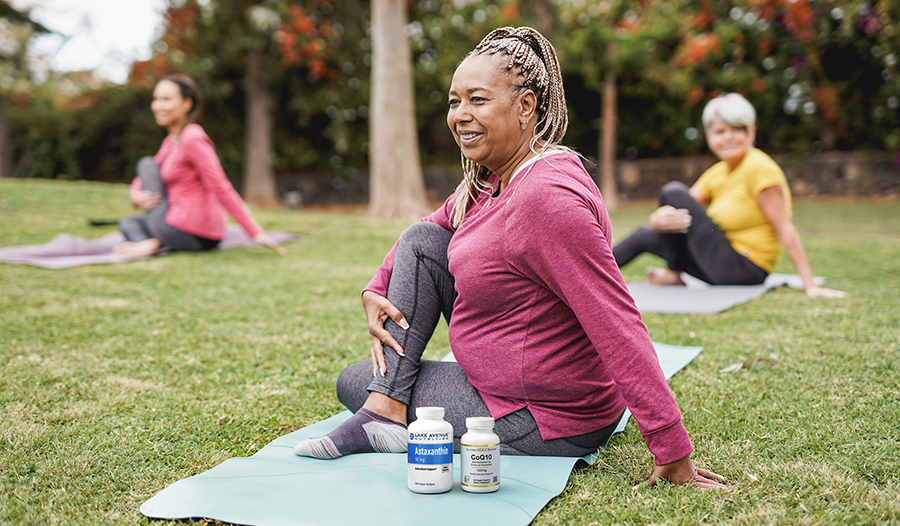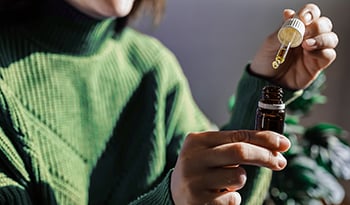5 Supplements for Anti-Aging: Skin, Joint, Vision Health, and More

While many people immediately think of wrinkles and fine lines when it comes to aging, the process of getting older often has damaging effects on the entire body, not just your skin. Aging affects the whole body, from the suppleness of the skin and flexibility of the joints to eyesight and metabolism.
Thankfully, nature has not left us without recourse when it comes to growing older. While we have not found the fountain of youth yet, nature has given us some pretty amazing resources that may help counteract the aging process and the damage that often comes with it.
Read on to discover five powerhouse anti-aging supplements.
1. Coenzyme -Q10 (CoQ10)
Undoubtedly, you’ve heard about the benefits of this body-made molecule for heart health, but did you know that CoQ10 is a powerful anti-aging compound as well? CoQ10, also called ubiquinol or ubiquinone, is a substance made naturally by the body. It can be found in virtually all tissues in the body, hence the name ubiquinol, which references its ubiquitous or universal bodily presence.
CoQ10 is made in the mitochondria or the tiny organelles that serve as powerhouses of the cell, and it plays an essential role in helping the body create the energy it needs to function.
Studies show that the body produces less CoQ10 with age. That decreased CoQ10 production can lead to increased cell death and is related to disorders like age-related macular degeneration, glaucoma, and even Alzheimer’s disease.
Although CoQ10 production decreases with age, supplementing with this phenomenal molecule may help to slow down the aging process. Studies have found that supplementing with CoQ10 reduces free radical damage in the body, regulates the body’s response to inflammation, and even improves deoxyribonucleic acid (DNA) repair systems! CoQ10 is an amazing molecule that may help reduce the negative effects of aging.
2. Astaxanthin
Astaxanthin is a marine compound that belongs to a group of molecules called carotenoids. Carotenoids, like beta-carotene, are precursors of vitamin A. Astaxanthin is the colorful molecule that gives salmon, trout, and lobster that characteristic pink or reddish color. While colorful, the biggest benefit of astaxanthin is its powerful anti-aging properties.
Unfortunately, as you age, the risk of developing type 2 diabetes increases. Studies suggest that this is due to age-related skeletal muscle dysfunction and increased insulin resistance. Insulin is the hormone that allows the cells to absorb sugar in the bloodstream. Increased insulin resistance means a greater chance for diabetes.
Fortunately, studies show that astaxanthin helps improve insulin resistance by reducing inflammation and free radical damage. Furthermore, we all know that our skin becomes less supple as we age due to collagen degradation and the damaging effects of ultraviolet (UV) rays from the sun. Astaxanthin could help to combat this problem. Research suggests that supplementing with astaxanthin protects skin from UV damage, improves skin elasticity, and reduces wrinkle formation. Astaxanthin is one powerful anti-aging substance!
3 & 4. Lutein and Zeaxanthin
Speaking of skin, there’s no anti-aging supplement quite like lutein and zeaxanthin. Aging can really put stress on the health, integrity, and appearance of the skin. Since the skin is the body’s largest organ, this is a big deal! As you age, your skin starts to lose its collagen and elastin. These are proteins that keep the skin supple and tight. As you lose more collagen and elastin, fine lines, wrinkles, drooping, and skin sagging can occur.
Unfortunately, that’s not the only thing that happens to aging skin. Aging skin also experiences higher amounts of free radical damage, DNA damage, and even telomere shortening. Telomeres are the ends of your DNA. Telomere shortening, which occurs with aging, has been associated with many different health conditions, including aging skin.
But lutein and zeaxanthin may prove to be valuable in the fight against aging skin. Lutein and zeaxanthin are xanthophylls, yellow pigments that belong to the carotenoid group of molecules. Lutein and zeaxanthin are most commonly found in green leafy vegetables like kale, broccoli, spinach, and lettuce. While eating a healthy balanced diet filled with veggies is essential in the fight against aging skin, research suggests that lutein and zeaxanthin supplementation provide the maximum benefit for DNA health.
One study even suggested that lutein and zeaxanthin supplementation, along with vitamin C, was associated with longer telomere length, and therefore better health, in older people. While that is amazing, lutein and zeaxanthin have also gotten studied for their benefit to skin health. Studies show that these two xanthophylls, when taken together, help block out damaging blue wavelengths, act as antioxidants for the skin, improve skin tone, skin brightness, and even skin color!
And we can’t forget the beneficial effects that these two powerhouse phytonutrients may have on the eyes. Both lutein and zeaxanthin are studied for their benefits to eye health, with research suggesting that they may help prevent age-related blindness and macular degeneration.
These two carotenoids may be fundamental in the fight against aging.
5. Resveratrol
There’s no supplement quite like resveratrol when it comes to protecting against aging. One of the greatest causes of aging is DNA damage due to an abundance of free radical species in the body. That is called oxidative stress. Increased amounts of oxidative stress cause accelerated aging. That’s where resveratrol comes in.
This amazing polyphenol gets found in peanuts, blueberries, dark chocolate, and even wine, but research suggests that the greatest benefits of resveratrol come from supplementation. For example, studies show that supplementing with resveratrol activates anti-aging pathways in the body.
That helps improve mitochondrial function and even helps promote the growth of new mitochondria. Studies also suggest that resveratrol acts as an anti-inflammatory by turning off specific inflammation-producing pathways in the body while also acting as an antioxidant by protecting DNA from free radical damage.
Takeaway
While getting older may not be a choice that you willingly make, some super supplements may help reduce the effects of aging. CoQ10, astaxanthin, lutein, zeaxanthin, and resveratrol are all powerhouse supplements for anti-aging with incredible benefits that may make you happy to have another birthday.
References:
- Hargreaves IP, Mantle D. Coenzyme Q10 Supplementation in Fibrosis and Aging. Adv Exp Med Biol. 2019;1178:103-112. doi:10.1007/978-3-030-25650-0_6
- Manzar H, Abdulhussein D, Yap TE, Cordeiro MF. Cellular Consequences of Coenzyme Q10 Deficiency in Neurodegeneration of the Retina and Brain. Int J Mol Sci. 2020;21(23):9299. Published 2020 Dec 6. doi:10.3390/ijms21239299
- Varela-López A, Giampieri F, Battino M, Quiles JL. Coenzyme Q and Its Role in the Dietary Therapy against Aging. Molecules. 2016;21(3):373. Published 2016 Mar 18. doi:10.3390/molecules21030373
- Shou, J., Chen, PJ. & Xiao, WH. Mechanism of increased risk of insulin resistance in aging skeletal muscle. Diabetol Metab Syndr 12, 14 (2020). https://doi.org/10.1186/s13098-020-0523-x
- Landon R, Gueguen V, Petite H, Letourneur D, Pavon-Djavid G, Anagnostou F. Impact of Astaxanthin on Diabetes Pathogenesis and Chronic Complications. Mar Drugs. 2020;18(7):357. Published 2020 Jul 9. doi:10.3390/md18070357
- Sztretye M, Dienes B, Gönczi M, et al. Astaxanthin: A Potential Mitochondrial-Targeted Antioxidant Treatment in Diseases and with Aging. Oxid Med Cell Longev. 2019;2019:3849692. Published 2019 Nov 11. doi:10.1155/2019/3849692
- Montpetit AJ, Alhareeri AA, Montpetit M, et al. Telomere length: a review of methods for measurement. Nurs Res. 2014;63(4):289-299. doi:10.1097/NNR.0000000000000037
- Sen A, Marsche G, Freudenberger P, et al. Association between higher plasma lutein, zeaxanthin, and vitamin C concentrations and longer telomere length: results of the Austrian Stroke Prevention Study. J Am Geriatr Soc. 2014;62(2):222-229. doi:10.1111/jgs.12644
- Souyoul SA, Saussy KP, Lupo MP. Nutraceuticals: A Review. Dermatol Ther (Heidelb). 2018;8(1):5-16. doi:10.1007/s13555-018-0221-x
- Demmig-Adams B, López-Pozo M, Stewart JJ, Adams WW 3rd. Zeaxanthin and Lutein: Photoprotectors, Anti-Inflammatories, and Brain Food. Molecules. 2020;25(16):3607. Published 2020 Aug 8. doi:10.3390/molecules25163607
- Pyo IS, Yun S, Yoon YE, Choi JW, Lee SJ. Mechanisms of Aging and the Preventive Effects of Resveratrol on Age-Related Diseases. Molecules. 2020;25(20):4649. Published 2020 Oct 12. doi:10.3390/molecules25204649
- Meng T, Xiao D, Muhammed A, Deng J, Chen L, He J. Anti-Inflammatory Action and Mechanisms of Resveratrol. Molecules. 2021;26(1):229. Published 2021 Jan 5. doi:10.3390/molecules26010229
DISCLAIMER:This Wellness Hub does not intend to provide diagnosis...
















































































 Table of Contents
Table of Contents
















